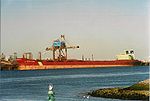
Capesize
Encyclopedia

Cargo ship
A cargo ship or freighter is any sort of ship or vessel that carries cargo, goods, and materials from one port to another. Thousands of cargo carriers ply the world's seas and oceans each year; they handle the bulk of international trade...
s originally too large to transit the Suez Canal
Suez Canal
The Suez Canal , also known by the nickname "The Highway to India", is an artificial sea-level waterway in Egypt, connecting the Mediterranean Sea and the Red Sea. Opened in November 1869 after 10 years of construction work, it allows water transportation between Europe and Asia without navigation...
(i.e., larger than both Panamax
Panamax
Panamax and New Panamax are popular terms for the size limits for ships traveling through the Panama Canal. Formally, the limits and requirements are published by the Panama Canal Authority titled "Vessel Requirements"...
and Suezmax
Suezmax
Suezmax is a naval architecture term for the largest ship measurements capable of transiting the Suez Canal, and is almost exclusively used in reference to tankers. Since the canal has no locks, the only serious limiting factors are draft , and height due to the Suez Canal Bridge...
vessels). To travel between oceans, such vessels used to have to pass either the Cape of Good Hope
Cape of Good Hope
The Cape of Good Hope is a rocky headland on the Atlantic coast of the Cape Peninsula, South Africa.There is a misconception that the Cape of Good Hope is the southern tip of Africa, because it was once believed to be the dividing point between the Atlantic and Indian Oceans. In fact, the...
or Cape Horn
Cape Horn
Cape Horn is the southernmost headland of the Tierra del Fuego archipelago of southern Chile, and is located on the small Hornos Island...
. In effect Capesize reads as "unlimited". Vessels this size can now transit the Suez Canal as long as they meet the draft restriction (18.91 m (62 ft) as of 2008)
Overview
Capesize vessels are typically above , and ships in this class include oil tankerOil tanker
An oil tanker, also known as a petroleum tanker, is a merchant ship designed for the bulk transport of oil. There are two basic types of oil tankers: the crude tanker and the product tanker. Crude tankers move large quantities of unrefined crude oil from its point of extraction to refineries...
s in the Very Large Crude Carrier (VLCC) and Ultra Large Crude Carrier (ULCC) classes; supertankers and bulk carrier
Bulk carrier
A bulk carrier, bulk freighter, or bulker is a merchant ship specially designed to transport unpackaged bulk cargo, such as grains, coal, ore, and cement in its cargo holds. Since the first specialized bulk carrier was built in 1852, economic forces have fueled the development of these ships,...
s transporting coal, ore, and other commodity raw materials. The term "capesize" is most commonly used to describe bulk carriers rather than tankers. A standard capesize bulker is around , although larger ships (normally dedicated to ore transportation) have been built, up to . The large dimensions and deep drafts of such vessels mean that only the largest deep water terminals can accommodate them.

